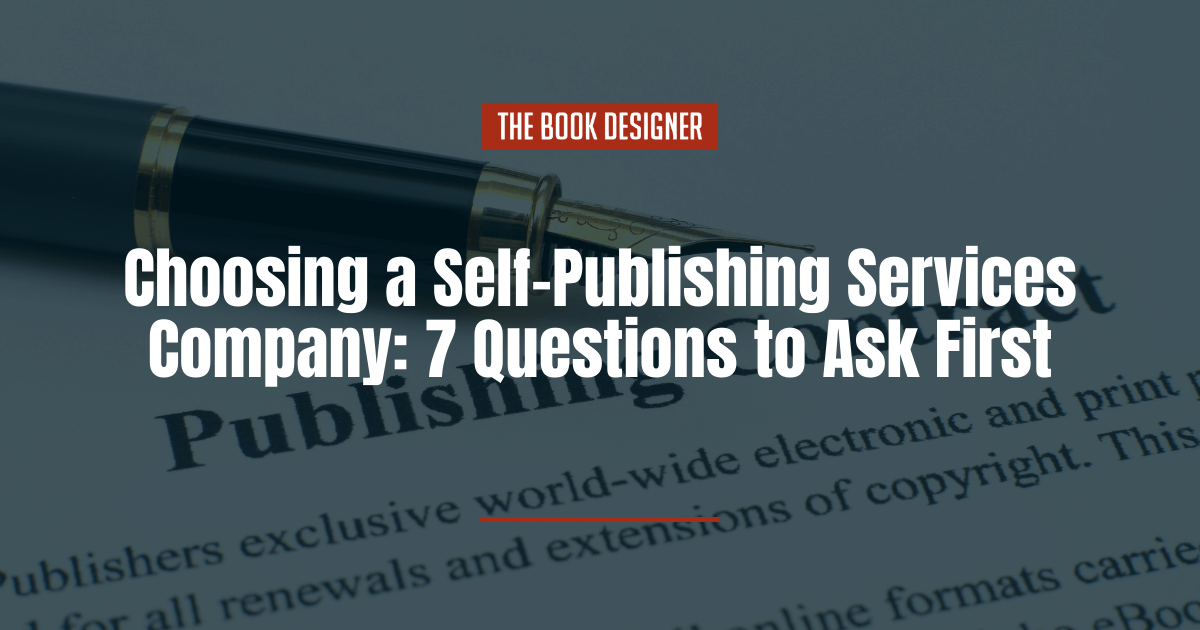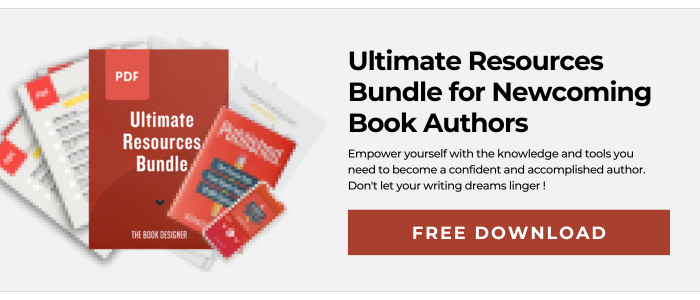First, I want to thank Joel Friedlander for the opportunity to write a monthly post on the legal issues of self-publishing, and particular about self-publishing services companies in this article. With wit and wisdom, Joel has helped many a writer (including me!) grow into an indie author. I am honored to be part of his team.
For the last 30 years, I have been a business attorney advising clients, including writers, on topics ranging from business set-up to copyright protection to collaboration agreements. My goal is to keep clients out of court and at their desks, working on new projects.
You’ll see a pattern in my posts. I want to give indie authors the legal tools to:
- control their work,
- avoid scams and lawsuits, and
- maximize tax savings.
Today, let’s start with CONTROL.
On the path to successful self-publishing, your first decision is whether to:
- engage a self-publishing service company (SPSC) to do everything from editing to distribution, or
- do-it-yourself by hiring editors, designers, and other professionals and uploading your print-ready files to a POD provider such as CreateSpace and/or IngramSpark.
You may also mix the two, since most self-publishing services companies have a la carte menus and many POD providers offer editorial, design, and marketing services as add-ons. You could hire a self-publishing consultant (like Joel) to walk you through the process. Literary agents are also jumping in and offering to help—for a percentage, of course.
When looking for a self-publishing services company, you’ll want to consider the following:
Hiring a Self-Publishing Services Company
If you are considering using a self-publishing services company and are feeling overwhelmed, join the club.
Dozens of SPSCs offer hundreds of self-publishing packages that include:
- editing
- design
- distribution
- marketing services
Prices range from $99 to $35,000+.
Some SPSCs claim to be created by authors for authors, to foster Christian values, or to pitch your work to Hollywood.
- How do you choose which company, which package, which price?
- Will a $600 custom cover sell more books than a $50 template cover?
- Will your editor have professional publishing experience or be an English major struggling through her first job?
- How do you measure quality, reliability, and integrity?
Don’t despair. I have looked at a lot of these websites and come up with seven questions to help you identify which SPSCs will give you the greatest control over the process and result.
You should be able to answer the first six by looking at the SPSC’s website. The last question may take a little more research.
The Seven Questions to Ask Any Self-Publishing Services Company
1. What is the lowest retail price you may set for your book?
Retail price? Isn’t that putting the cart in front of the horse? What about editing and design? Print quality? Yes, they matter, but only if your book is competitively priced.
Believe it or not, some self-publishing services companies control the retail price of your print book and set it unrealistically high. One company claims its high pricing is author-friendly because it increases potential royalties. Forget it.
You may have a fabulous book, perfectly edited, with a stunning cover and interior, but if it is priced at $20 alongside bestsellers priced at $15, $12, or $8, no one will buy it.
To market your book successfully, the price must be competitive. I would stay away from any SPSC that will price your book out of the market. You should control the retail price of your book. Period.2. What is the author price for your book (the price you pay per copy)?
As an indie author, you will be buying a lot of books and giving them away to reviewers, bloggers, friends and family, or reselling them at readings, school visits, conferences, and through your website. Choose a self-publishing services company that will sell your books to you at a reasonable author price.
The SPSCs that set high retail prices typically offer to give their authors a measly 30% discount. So, if they price your book at $19.95, you will pay $13.96 per copy, plus another $2 to $3 for shipping and handling. That’s ridiculous.
The author price should be the actual printing costs plus a reasonable markup (15-20%) and not a discount from the retail price. Why pay more because the SPSC sets the retail price at $20 instead of $10? The printing costs are the same. You will have already paid the SPSC hundreds, if not thousands, of dollars for design, editorial, and marketing services. Why pay double or triple the printing costs for a copy of your own book?
Let’s take a hypothetical 250-page, 6” x 9”, black-and-white trade paperback on standard paper. The cost for POD printing is approximately $4.39 per copy. As of September 2023, for this hypothetical book:
- Draft2Digital does not set the retail price, and its author price was $4.55 per copy.
- IngramSpark does not set the retail price, and its author price was $4.78 per copy.
- Barnes & Noble Press does not set the retail price, and its author price was $4.22 per copy.
- Amazon KDP does not set the retail price, and its author price was $4.00 per copy.
In my opinion, a self-publishing services company that sets a high retail price for your book is not expecting to make money by selling it to the public. They are going to make money selling it to you at a high author price. Dump that SPSC from your list and move on.
3. What royalties will you earn?
You should be able to calculate your royalties online by assuming different trim sizes, pages and retail pricing. I would be suspicious of any self-publishing services company that did not have a royalty calculator on its website. If the website states that pricing, royalties and such cannot be determined until your manuscript is reviewed or formatted (and typically after you have given them your credit card number and paid a nonrefundable amount), move on to another SPSC.
4. Is the agreement exclusive or non-exclusive?
You should never give a self-publishing services company any exclusive rights to your work. And no options on any other works, formats, movie rights, subsidiary rights, anything.
SPSCs are not traditional publishers that has invested capital in your book. They are service providers only and are not be entitled to any exclusive rights or options.
You might not be able to answer this question without looking at the SPSC’s contract. A reputable SPSC will post its contract online. Avoid any SPSC that will not release its contract until you sign up. For help reading the contracts, check out my post A Writer’s Worst Mistake.
5. Is it easy to terminate the agreement?
You should have the right to terminate the relationship with any self-publishing services company following no more than 30 days’ notice delivered via email. None of this certified mail, return receipt nonsense. After termination, the SPSC may have the right to sell off its existing inventory, but that’s it. It should not have the right to continue to print and sell your book, even if the right is nonexclusive. If a traditional publisher were interested in your work, they might want you to buy out your former SPSC before they penned a deal.
6. Will you get production-ready files upon termination?
If you terminate, the self-publishing services company should give you the final production-ready files of your cover and interior at no or low cost. Not PDFs of your print-ready files, but the actual, functional production files in Adobe InDesign or comparable format. If you move your book to a new printer without the production-ready files, then you’ll have to create new files at considerable cost. It is outrageous for an SPSC to hold onto these files after you’ve paid for the design, editing, and layout work. You own the work product and should control it.
7. What is the reputation of the company?
Go to websites like Predators & Editors, Absolute Write Water Cooler, and Writers Beware and search for information about the self-publishing services company you’re considering. Reviews may be available at The Independent Publishing Magazine site. Read about the lawsuit against Author Solutions and its affiliated companies.
Every company will have its share of unhappy customers, so sort through the complaints to get a sense of which ones are legitimate. If you find multiple reports from unhappy customers, stay away.
I do not want to scare you away from using an SPSC. Some offer reasonable deals and enjoy solid reputations. They permit you to control the process and the result. But do your homework before you commit. To learn more about the legal issues of self-publishing, check out my book, Self-Publisher’s Legal Handbook and my blog .

Helen Sedwick, is a Contributing Writer for The Book Designer. She is also an author and a California attorney with thirty years of experience representing businesses and entrepreneurs. Her latest book is Self-Publisher’s Legal Handbook: The Step-by-Step Guide to the Legal Issues of Self-Publishing.
You can find more information about Helen here.
Photo: bigstockphoto.com. Amazon links contain my affiliate code.




